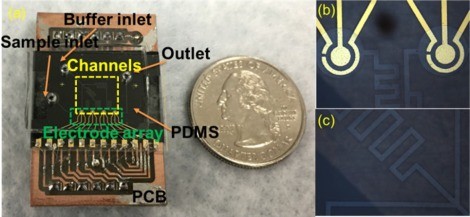Dr. Wan Hao in Prof. Wang Ping’s group, College of Biomedical Engineering and Instrument Science, Zhejiang University published a research paper in 《Sensors and Actuators B: Chemical》(IF:5.667, TOP SCI) entitled “Tunable and quantitative serial dilution on multi-channel miniaturized microfluidic electrochemical platform” (https://doi.org/10.1016/j.snb.2018.08.003). This paper presents a novel multichannel miniaturized microfluidic electrochemical platform featuring tunable and quantitative serial dilution.
Electrochemical technique has been widely applied in trace analysis due to high sensitivity, low detection limit, low time cost and simple instrumentation. Conventional approaches to generating gradients are generally complicated and time-cost with unpredictable and uncontrollable profiles over time and space. This paper presents a multi-channel miniaturized microfluidic electrochemical platform featuring tunable and quantitative serial dilution by integrating with microfluidic device and multichannel electrochemical chip. By continuously sharing and diluting samples from prior channels, this platform can effectively reduce sample cost with only one outlet required. Both the microfluidic device and the multichannel electrochemical chip were fabrication by standard photolithography microfabrication. This miniaturized electrochemical platform was achieved by the alignment and bonding of the microfluidic device and the electrochemical chip. The platform with four independent channels was tested in potassium ferricynide/ferrocynide to validate the performance and serial dilution functionality in electrochemical sensing. Experimental results were demonstrated and well matched simulation results. The platform featuring tunable and quantitative serial dilution provides a promising approach to generating precise and tunable gradients that can enable fast calibration in electrochemical sensing.

